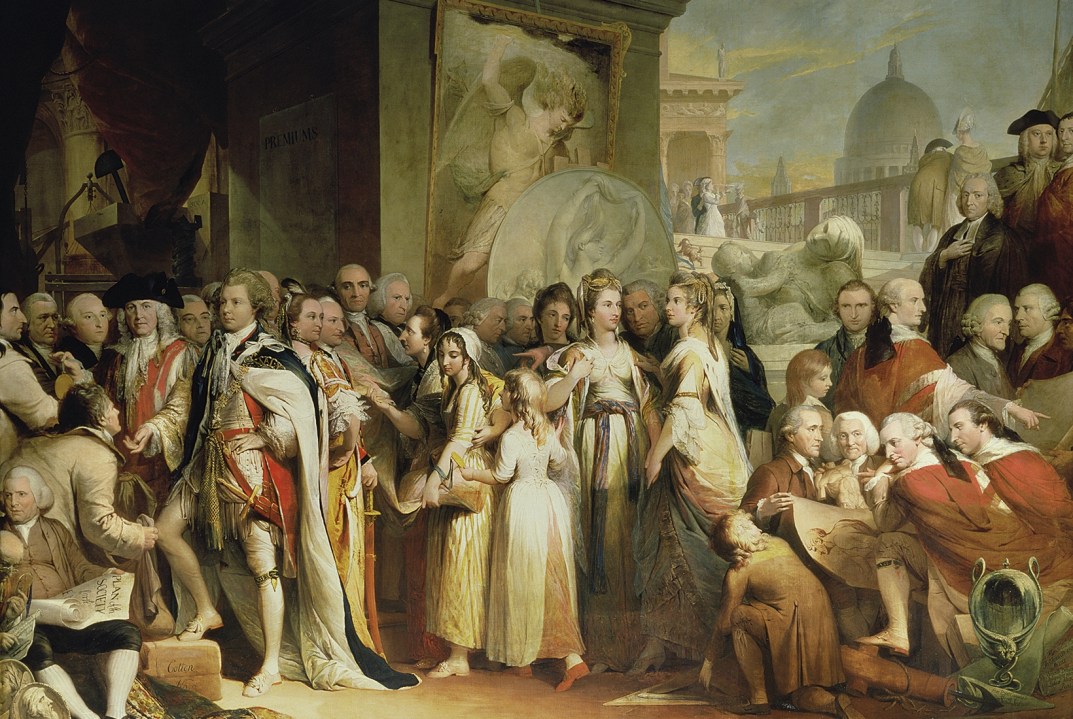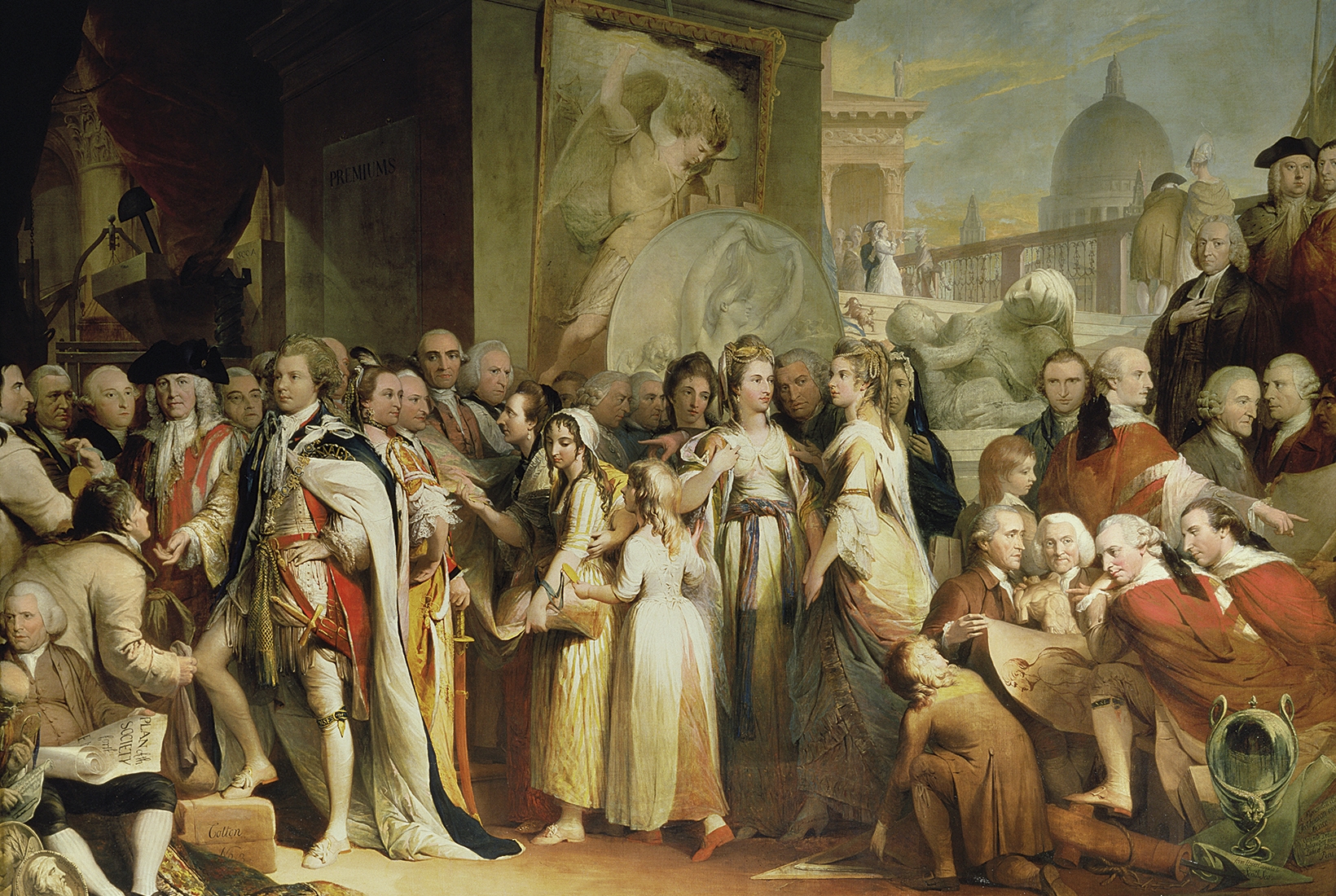What does Jony Ive, the designer of Apple’s iPhone, have in common with Peter Perez Burdett, the first Englishman to produce aquatints, and Ann Williams, a postmistress who bred silkworms at her home in 18th-century Gravesend? The answer is that they all received awards from the institution known today as the Royal Society of Arts. Ive bagged a £500 travel bursary for creating a futuristic telephone nicknamed the Orator; Burdett earned £100 for a detailed map of Derbyshire; and Williams collected a 20-guinea prize for her observations about the lepidoptera she mistakenly called ‘dear little innocent reptiles’.
As Anton Howes demonstrates in this lucid and scrupulously researched history, such bounty is the raison d’être of the RSA. But the purpose of this 266-year-old institution is not widely understood. One misconception is that it is preoccupied with art. In reality, as Howes explains, it resembles a ‘subscription-funded national improvement agency’. Yet the multifarious nature of its activities has long been a gift to the satirically minded.
Its founder William Shipley inadvertently set the tone, proposing vast schemes and wacky ones — on the one hand a way to increase the national supply of fish, on the other a means of damp-proofing shoes using tin foil. A Victorian contributor to Punch could pretend that the Society’s programme of forthcoming events included lectures on pickles, torpedoes and polygamy.
Punch pretended that the Society’s programme included lectures on pickles, torpedoes and polygamy
The origins of the Society (which didn’t become ‘Royal’ until 1908) lie in what Howes describes as ‘the redirection of private interests to the benefit of the public’. Shipley was a benevolent, cultivated introvert who collected coins and liked fiddling with barometers. He hung around in London’s coffee houses, and as he tuned into their intellectual buzz he began to think about setting up a similarly energetic community. Its aim would be to convince inventors and skilful amateurs to renounce self-interest in favour of public-spirited endeavour.
Shipley drew inspiration from the Dublin Society for Promoting Husbandry, founded in 1731. Impressed by its experiments in agriculture and botany, he and ten like-minded men in 1754 declared themselves the Society for the Encouragement of Arts, Manufactures and Commerce.
At first, progress was slow. On one occasion Shipley arrived for a meeting and spent two hours waiting in vain for anyone to join him. Yet by 1758 he had attracted 700 subscribers, and by 1764 the Society was awarding £8,000 a year in ‘premiums’ to people whose ventures looked promising. By this time it occupied substantial premises off the Strand, and when these proved insufficient it moved to a handsome neoclassical building that was part of James and Robert Adam’s Adelphi development. Edmund Burke, Adam Smith and Benjamin Franklin were members; among later ones, Charles Dickens, William Wilberforce, Karl Marx and Marie Curie stand out. Since 1914 members have been called fellows, and today there are 30,000. Billed as ‘proactive problem solvers’, they include the telegenic choirmaster Gareth Malone and the bassist-turned-cheesemaker Alex James.
Early on, the Society championed schemes with a humanitarian bent: the ventilation of prisons, reducing the smoke emissions of steam engines, a mechanical means of sweeping chimneys so that the job no longer had to be done by children. There were proposals to raise beef cattle more economically and to prevent the forgery of banknotes. Meetings could be dauntingly intense. On one visit, Samuel Johnson excited admiration with a speech about mechanics, but another time he faltered and was moved to admit that ‘all my flowers of oratory forsook me’. The painter Francis Hayman, struck by his fellow members’ vicious style of argument, concluded it would be wise to ‘drown their heart-burnings in bumpers of wine’.
Today the RSA’s atmosphere is comparatively sedate. The talk is of platforms, toolkits and educational projects, driven by ‘social system entrepreneurs’. The subject is not a mirthful one, and Howes rarely tries to ginger it up. In the opening chapter he mentions the fall from grace of Henry Sully, an 18th-century financial speculator, and writes ‘Sully’s reputation was sullied’. But otherwise there is careful coverage of internal wranglings, the quest for extra funding and the changing status of regional committees.
This befits a history commissioned by the RSA itself, but risks aridity. What saves the book from becoming merely dutiful is Howes’s eye for quirky detail. When John Everett Millais went to receive a prize for drawing from the Society, aged nine, he was so small that the president couldn’t see him over his desk and surmised that he hadn’t turned up. A few years later the six-year-old dwarf General Tom Thumb was visiting London with Phineas T. Barnum; the Society’s secretary Francis Whishaw, never shy of publicity, somehow convinced him to attend a presentation on beehives.
What’s more, Howes advances a larger argument about the nature of innovation. The book’s heroes are people who perceived room for improvement where others had seen none. Crucially, they shared their ideas rather than hoarding them. For almost half its history, the Society would make no award to an invention that had been patented, on the principle that valuable information should be broadcast and monopolies prevented. Even after this policy was dropped, the RSA fostered a particular mentality: a delight in intellectual openness and the rewards of pooling one’s resources. As Shipley wrote in 1753, genius can subsist ‘even in the most supine and barbarous periods’, but endears itself to posterity ‘by falling into a more fertile soil, and being exerted under more favourable influences’.







Comments